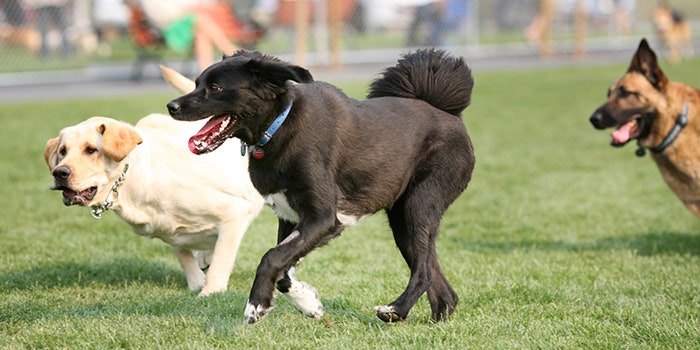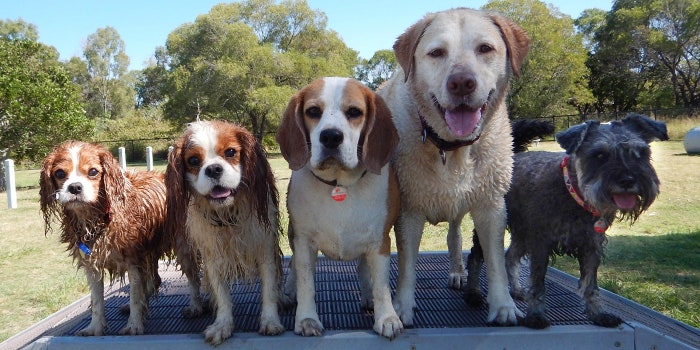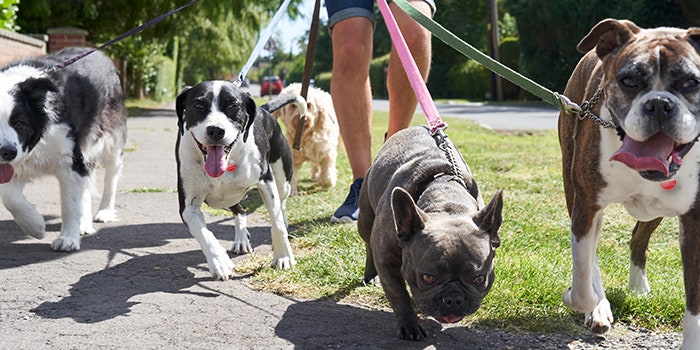Top Tips for Selecting a Dog Daycare
Recommendations for finding a post-pandemic care solution that is perfect for your dog.
Amid the sea of hardship and suffering brought on by the pandemic, there was at least one small upside to lift our spirits: all that time stuck at home gave us plenty of opportunities to play with our pets! Over the past year, many pet parents found themselves with more time for long walks with their dogs and marathon games of fetch. And as the months of isolation dragged on, even people who’d never cared for a pet before made room in their hearts and homes for a new pet, helping to empty local shelters in record numbers.
However, as the world slowly begins to return to ’normal,’ a new study from M/A/R/C® Research reveals that many of these first-time pet parents may be facing new challenges. Nearly 60% of the first-time dog owners surveyed said that they are considering re-homing their dogs once the pandemic ends.
Transitioning back to work outside the home and helping pets cope with the change can seem overwhelming for any pet parent. But relinquishing a pet who has become a part of the family takes a toll on everyone involved. So here are some helpful tips to help you weather the transition and keep your furry best friend with you.
The key to a successful transition
First, don’t panic and make any rash decisions that are difficult to undo. Dogs, like people, are adaptable. They can learn to accept even major changes in their daily lives, as long as they know they are still loved.
Next, talk to your veterinarian or a certified behaviourist about your specific concerns. If you're heading back to work outside the home after a long period of quarantine, remember that your dog is likely to need some help adjusting to the change, too. Now may be the perfect time to consider the benefits of doggy daycare or regular visits with a dog walker — both as a proactive support system for this tricky transition period and for your pet’s long-term health and socialization needs.
When it comes to choosing the right daytime care solution for your dog, there are plenty of services to consider — from dog daycare franchises with locations across North America to independent operators — so you can find exactly what you and your dog need. Larger cities may have a broader selection, but with some planning and creativity, you can find the right care for your pet no matter where you live.

How to tell if your dog is ready for daycare
Finding a daycare that’s a good fit for your dog requires research and even a little detective work. But before you start evaluating doggy daycare options, it’s important to evaluate if your pet is ready for this change.
How well socialized is your pet? Many pandemic puppies have missed out on the formative first year of socialization due to restrictions on social gatherings and the closure of dog parks. And, just like people, even dogs accustomed to others may be a bit out of practice after all these months.
If your pet is uncomfortable around other dogs, daycare could be stressful and dangerous — for your dog and other pups. To test the waters and prepare your pet, make it a point to expose your dog to other dogs, as well as larger packs — at re-opened dog parks or even a backyard meet-up with friends. As you begin to broaden your own social circle, bring your dog so they get used to car rides and people outside the core family. Until your dog can tolerate larger groups of animals and social situations consistently, group daycare is not appropriate.
Pet daycare is not a substitute for proper socialization. If you have time before returning to work, consider enrolling your dog in obedience classes or a similar type of training group to learn how to behave and play with other dogs appropriately. If you need daytime care for your unsocialized dog right away, ask your veterinarian about day boarding. That way, your pet will have their own kennel and still receive lots of walks and attention throughout the day without risking anyone’s safety.
Finding the right dog daycare for your pet
For well-socialized dogs who have experience playing with others and enjoy meeting new dogs, doggy daycare can be a dream come true. Once you’ve determined that your dog is ready, it’s time for a little R&D — research and detective work. Every dog is different, and the same goes for daycare centres. You’ll find options ranging from fully-staffed, state-of-the-art commercial daycare facilities to small, intimate in-home daycare options. You know your pet better than anyone, so your job is to dig up as many details and answers as you can from any prospective daycare to determine which one is the best fit for your pet’s specific needs, energy level, and personality. Here are some specifics to consider when searching for a dog daycare:
Structure
How will your dog spend their day? Group facilities often offer either all-day play or playtime with designated nap breaks, which can be better for younger or older dogs. Some places separate dogs by size and energy level while others mix everyone together or only segregate as small versus large dogs. When you visit the daycare, do you find it playful or rigid? Orderly or chaotic? Keep in mind that the behaviours and expectations dogs grow accustomed to at daycare often accompany them home — for better or for worse. So choose a daycare with a structure you aspire to, rather than one you can simply tolerate.
Key questions to ask:
- Does your dog have to interview before starting?
- What will your dog be doing all day?
- What are the facility’s hours?
- What happens if you are late picking up your dog?
- Are there cameras you can log into from work?
- How many staff are monitoring the dogs and what kind of training do they get?
- Do you have to select specific days for your dog to attend or can you just drop off your dog when you need to?

Safety
Of course, you want your dog to be safe at any daycare. But be aware occasional (and minor) cuts and bruises may happen from time to time, simply because dogs like to play. And even the best-behaved dogs can sometimes get a little too rough with their roughhousing.
However, there’s a big difference between that and a serious injury due to aggression or fighting. So it’s important to find out what policies the daycare has for keeping all dogs safe. Ask the facility what their protocols are to avoid, document, and treat wounds if they happen, as well as their philosophy on discipline and corrective behaviours. Don’t forget, it’s not just your precious pooch who needs protecting. There’s always the chance that your dog could be the aggressor. In that case, you may be required to pay for the other dog’s treatment, although legal responsibility varies.
Cleanliness, health, and safety standards are key indicators of a quality daycare. You want a doggy daycare that doesn’t just meet mandatory provincial standards and requirements but exceeds them.
Take a close look at the daycare’s health prerequisites to gauge how much emphasis the daycare places on protecting pets from health and safety risks. Strong standards don’t mean your pet won’t get sick — dogs who attend daycare are more prone to some easily transmitted (and easily-treated) illnesses and parasites — but they could reduce the chances.
All dogs should be fully vaccinated (or in the case of young puppies, receiving their booster series) before starting daycare — and that includes the non-core Bordetella vaccine, which protects dogs against kennel cough. It’s also a good idea for dogs to have effective flea and tick control as well as heartworm prevention that includes broad-spectrum protection against intestinal parasites. Talk to your veterinarian if you have any questions.
As far as cleanliness goes, survey the ground surfaces inside and outside the daycare. Indoors, concrete and linoleum are often the surfaces of choice because they allow for easy cleanup and disinfection. Outdoors, artificial turf is excellent and gravel is good, but grass and dirt make mud and allow for the spread of fleas and intestinal worms.
And don’t forget to check out the environment to ensure your dog’s comfort is a priority. Inside should feature updated heating and cooling systems with environmental controls. Outside, make sure there’s a plan for keeping dogs cool and protected from the heat in the summer or the cold and rain/snow in the winter.
Key questions to ask:
- If your dog has a major injury, which veterinary clinic do they use?
- Can staff give medications?
- How do they break up fights?
- Will you get a behavioural report card each day?
- Have there been any recent outbreaks of kennel cough or flea infestations?
Referrals
There are no official certification programs for dog daycare facilities. So it’s important to gather input from as many sources as possible. Always ask if the daycare can connect you with pet parents whose dogs are currently enrolled, so you can find out about their experiences. When considering online reviews and ratings, try to stick to sites that require proof that the reviewer has first-hand experience with the service. And don’t forget to ask your veterinarian for daycare recommendations. If they’ve treated dogs injured at daycare, they may be able to help you steer clear of options with higher incident rates.
How to tell if your dog likes daycare
If your dog gets excited when you pull into the parking lot, that is a great sign. If your dog doesn’t even look back when the staff member takes the leash from you, that is even better (even if it stings a bit). If your dog hesitates to get out of the car or seems reluctant to go inside, that is a sign that you should take her somewhere else. If the facility writes daily report cards, read what they have to say, and if they don’t then ask the staff at pick-up. If your dog consistently spends a large part of the day in the corner or in time-out, they are telling you group daycare isn’t right for them.
Dogs who attend daycare should sleep great at night. You might notice they are less attached to you in the evening, instead electing to plant themselves on the couch and monitor the house from there.

Choosing the right dog walker for your pet
If your dog does not like other dogs or is very selective in her playmates, a dog walker may be a better choice. Dog walkers come to your house to walk your dog according to whatever expectations you’ve agreed on, and then they leave. They may text you or send picture updates to document their visit and send you some doggy love. Some dog walkers will also train your dog during visits while others offer special services like running, trail running, or swims in the lake.
Because they come to your house, you don’t have to live by the operating hours of a daycare facility or drive in the wrong direction from work through traffic at drop-off and pick-up. On the other hand, you have to trust this person enough to let them into your home unattended.
Interviews are very important when selecting a dog walker. Honestly though, if you trust them with your precious fur kid then you shouldn’t have to worry about your possessions.
Dog walkers are a great choice for puppies who are not yet socialized, too young for daycare, or simply can’t make it through your full workday without a potty break. On the other end of the age spectrum, senior dogs can also benefit from a dog walker who encourages them to be more active, since the longer they stay still the harder it is to move afterward. Dog walkers are also a more viable option for dogs that get very car sick and those with certain medical conditions (e.g., dogs with seizure conditions may be triggered by the excitement of group daycare).
When it comes to choosing a dog walker, you may find options ranging from lifelong dog-lovers willing to side hustle for some extra income to full-time dog walkers with certifications, training, insurance (and often a full roster of clients). In larger towns, you may even be able to use a website or app like Rover.com to match you with potential walkers in your area. However, it’s always a good idea to read the fine print so you can understand key details, like the criteria for listing a dog walker and how to report any problems you may encounter.
Just like dog daycare facilities, it’s important to do your homework when it comes to dog walkers, no matter how you find them. Read online profiles carefully to determine if the walker has experience with dogs like yours. A list of testimonials and positive reviews is a good sign. But don’t rule out someone who is just getting started and may not have many reviews — they could still have the perfect skill set for your needs. As always, the best recommendations are word of mouth, so ask your veterinarian and pet parent friends if they have any dog walkers or pet sitters they really like.
Comparing the cost of daycare and dog walking
Every dog is part of a family and every family has a budget, so it’s important to weigh how daycare or hiring a dog walker will impact your wallet. Costs can vary widely based on your location, needs, and the solution you choose, but here are some general considerations:
Daycare usually costs $15-$30 per day. Most facilities let you buy packages to lower the cost. One or two days per week may be enough to keep your dog happy and relaxed on their days home alone. Other dogs may need to go every day at least for a little while. When you make your budget consider that as your dog ages, they won’t need as much vigorous exercise and so your doggy daycare bill may go down.
Dog walkers charge between $10 and $40 for their services which usually include a 30-60 minute walk. Some walkers charge per dog while others charge per visit. Just like with daycare, some dog walkers will ask you to sign up for specific days while others are more flexible and only require 24 hours’ notice.
If these options are outside your budget, consider some workarounds. Does your dog have friends in the neighbourhood they could stay with on some days? Maybe you can also split the cost of a dog walker. Do you have friends who work a different schedule than you who might be able to walk your dog? You may even be able to reduce the cost of daycare by offering to clean kennels for a few hours a week or bartering with other skills you have.
For all the love, snuggles, and comfort our dogs have given us during this never-ending pandemic isolation, they deserve the very best. No matter how worried you are about how your dog will handle the change, preparing them for a smooth transition is far easier on everyone than the trauma of relinquishing or re-homing your pet. And with so many options available to help you care for your pet after you shift back to office work, you are sure to find one that delivers comfort and peace of mind...for you and your dog.
Dr. Hanie Elfenbein is a veterinarian whose medical philosophy centres around the pet as part of the family and working within that relationship to resolve medical issues and strengthen the human-animal bond. She shares her home with Loki, a "Heinz 57" dog she adopted in 2017. Loki goes to work with Dr. Elfenbein at her veterinary clinic, where he sits on anyone's lap who sits down (he's 50 pounds) and is the official taste-tester of all lunches.